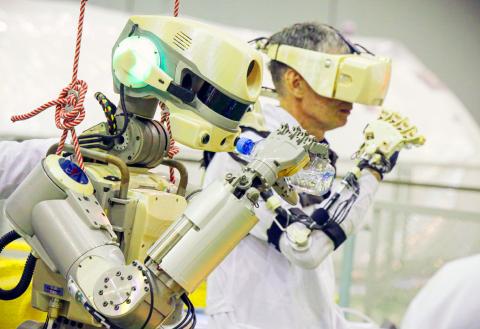Russia yesterday launched an uncrewed rocket carrying a life-size humanoid robot that is to spend 10 days learning to assist astronauts on the International Space Station.
Named Fedor, for Final Experimental Demonstration Object Research, with identification number Skybot F850, the robot is the first ever sent up by Russia.
Fedor blasted off in a Soyuz MS-14 spacecraft at 6:38am from Russia’s Baikonur cosmodrome in Kazakhstan. The Soyuz is to dock with the space station tomorrow and stay until Sept. 7.

Photo: AFP / ROSCOSMOS / Space Center Yuzhny / TsENKI
Soyuz ships are normally crewed on such trips, but no humans are traveling this time to test a new emergency rescue system.
Instead of cosmonauts, Fedor was strapped into a specially adapted pilot’s seat with a small Russian flag in his hand.
“Let’s go. Let’s go,” the robot was heard as “saying” during launch, apparently repeating the famous phrase by first man in space, Yury Gagarin.
The 1.8m silvery robot weighs 160kg.
Fedor has Instagram and Twitter accounts that describe it as learning new skills, such as opening a bottle of water. In the station, it is to trial those manual skills in low gravity.
“That’s connecting and disconnecting electric cables, using standard items from a screwdriver and a spanner to a fire extinguisher,” Roscosmos State Corp for space activities director for prospective programs and science Alexander Bloshenko said in televised comments ahead of the launch.
“The first stage of in-flight experiments went according to the flight plan,” the robot’s account tweeted after reaching orbit.
Fedor copies human movements, a key skill that allows it to remotely help astronauts or even people on Earth carry out tasks while they are strapped into an exoskeleton.
Such robots would eventually carry out dangerous operations such as space walks, Bloshenko told the RIA Novosti state news agency.
On the Web site of one of the state backers of the project, the Foundation of Advanced Research Projects, Fedor is described as potentially useful on Earth for working in high-radiation environments, demining and tricky rescue missions.
Onboard, the robot is to perform tasks supervised by Russian cosmonaut Alexander Skvortsov, who joined the International Space Station last month, and is to wear an exoskeleton in a series of experiments later this month.
Roscosmos director-general Dmitry Rogozin earlier this month showed photographs of the robot to Russian President Vladimir Putin, saying it would be “an assistant to the crew.”
“In the future we plan that this machine will also help us conquer deep space,” Rogozin said.
Fedor is not the first robot to go into space.
In 2011, NASA sent up Robonaut 2, a humanoid robot developed with General Motors with a similar aim of working in high-risk environments.
It was flown back to Earth last year after experiencing technical problems.

The Burmese junta has said that detained former leader Aung San Suu Kyi is “in good health,” a day after her son said he has received little information about the 80-year-old’s condition and fears she could die without him knowing. In an interview in Tokyo earlier this week, Kim Aris said he had not heard from his mother in years and believes she is being held incommunicado in the capital, Naypyidaw. Aung San Suu Kyi, a Nobel Peace Prize laureate, was detained after a 2021 military coup that ousted her elected civilian government and sparked a civil war. She is serving a

‘NO AMNESTY’: Tens of thousands of people joined the rally against a bill that would slash the former president’s prison term; President Lula has said he would veto the bill Tens of thousands of Brazilians on Sunday demonstrated against a bill that advanced in Congress this week that would reduce the time former president Jair Bolsonaro spends behind bars following his sentence of more than 27 years for attempting a coup. Protests took place in the capital, Brasilia, and in other major cities across the nation, including Sao Paulo, Florianopolis, Salvador and Recife. On Copacabana’s boardwalk in Rio de Janeiro, crowds composed of left-wing voters chanted “No amnesty” and “Out with Hugo Motta,” a reference to the speaker of the lower house, which approved the bill on Wednesday last week. It is

‘EAST SHIELD’: State-run Belma said it would produce up to 6 million mines to lay along Poland’s 800km eastern border, and sell excess to nations bordering Russia and Belarus Poland has decided to start producing anti-personnel mines for the first time since the Cold War, and plans to deploy them along its eastern border and might export them to Ukraine, the deputy defense minister said. Joining a broader regional shift that has seen almost all European countries bordering Russia, with the exception of Norway, announce plans to quit the global treaty banning such weapons, Poland wants to use anti-personnel mines to beef up its borders with Belarus and Russia. “We are interested in large quantities as soon as possible,” Deputy Minister of National Defense Pawel Zalewski said. The mines would be part

Cozy knits, sparkly bobbles and Santa hats were all the canine rage on Sunday, as hundreds of sausage dogs and their owners converged on central London for an annual parade and get-together. The dachshunds’ gathering in London’s Hyde Park came after a previous “Sausage Walk” planned for Halloween had to be postponed, because it had become so popular organizers needed to apply for an events licence. “It was going to be too much fun so they canceled it,” laughed Nicky Bailey, the owner of three sausage dogs: Una and her two 19-week-old puppies Ember and Finnegan, wearing matching red coats and silver